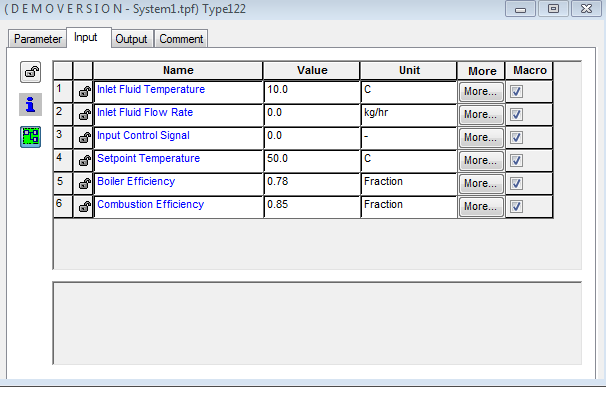That's brilliant

The thing I am just struggling to follow is, if for instance for a boiler the input value for the boiler efficiency is set and the Macro button is toggled, are we expecting the efficiency to stay fixed during the time? and how the macro is impleneted here. The problem is I can't find the documentation of Boiler's in 2017 version.

On 7 November 2017 at 15:30, Jeff Thornton <thornton@tess-inc.com> wrote:
Sadjad,Absolutely that's how TRNSYS works. TRNSYS models take time independent values called PARAMETERS and time-dependent values called INPUTS together to calculate the OUTPUTS from the model. The inputs can be from another model, set to a constant value, read from an external file, set by a function etc.We have several "heating unit" models and they differ on how they calculate the performance. Most read a performance data file that returns a value based on the inlet operating conditions.JeffTESS LLC
Sent from my iPhone
On Nov 7, 2017, at 3:40 AM, Seyyed Tajdaran via TRNSYS-users <trnsys-users@lists.onebuilding.org> wrote:Hello allI am looking into use TRNSYS for dynamic simulation. However, I am struggling to find out if the software actually works in a dynamic condition. To be specific I would like to know if the efficiency of a heating unit is calculated as a function of the relevant parameters (i.e. time, temperature, pressure)???
Warm regards,Sadjad--
Sadjad Tajdaran
PhD Candidate | Research Assistant
Oxford Brookes University, School of Architecture, Faculty of Technology Design and EnvironmentArchitectural Engineering GroupJP203, John Payne Building,Headington Campus, Gipsy Lane, Oxford, UK, OX3 0BP_______________________________________________
TRNSYS-users mailing list
TRNSYS-users@lists.onebuilding.org
http://lists.onebuilding.org/listinfo.cgi/trnsys-users-onebuilding.org
Sadjad Tajdaran
Research Assistant | PhD candidate
Oxford Brookes University, Faculty of Technology Design and Environment
Research Assistant | PhD candidate
Oxford Brookes University, Faculty of Technology Design and Environment
Architectural Engineering Group and DYNAMO Project Group
JP204, John Payne Building, Headington Campus, Gipsy Lane, Oxford, UK, OX3 0BP
R201, R Building, Wheatley Campus, Wheatley, Oxford, OX33 1HX
_______________________________________________ TRNSYS-users mailing list TRNSYS-users@lists.onebuilding.org http://lists.onebuilding.org/listinfo.cgi/trnsys-users-onebuilding.org